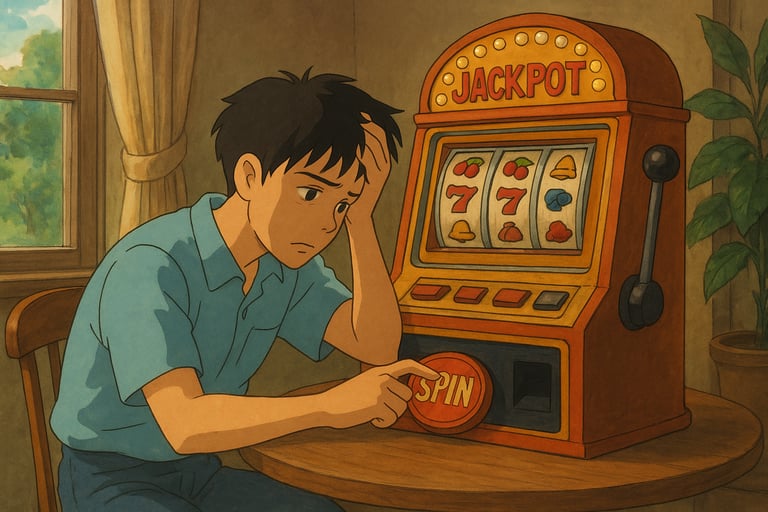How to Overcome Gambling Addiction: Steps to Regain Control (2025)
Struggling with gambling addiction? Learn effective strategies to quit, regain control, and build a healthier lifestyle. Trusted insights from Gamblinghood.
AWARENESSCASINO TIPS
9/17/20253 min read
How to Overcome Gambling Addiction: Complete Guide to Regain Control (2025)
Gambling is often marketed as entertainment, but for many, it becomes a destructive addiction. From online casinos and sports betting apps to poker rooms and slot machines, gambling’s easy access has fueled rising addiction rates worldwide. If left unchecked, it can devastate finances, strain relationships, and impact mental health.
The good news? Gambling addiction is treatable. With the right mindset, resources, and support systems, anyone can take back control of their life. This in-depth guide explores practical steps, treatment options, and lifestyle changes to overcome gambling addiction in 2025.
1. Understanding Gambling Addiction
What is Gambling Addiction?
Gambling addiction, also called compulsive gambling or gambling disorder, is when someone cannot resist the urge to gamble, despite harmful consequences. It is recognized as a behavioral addiction, similar to drug or alcohol dependency.
Signs of Gambling Addiction
Constant preoccupation with gambling
Increasing bets to chase losses
Hiding or lying about gambling habits
Borrowing money or using savings to gamble
Mood swings when unable to gamble
Why Gambling is So Addictive
Dopamine triggers: Wins release dopamine, reinforcing the habit.
Variable rewards: Slot machines and betting odds mimic psychological reward loops.
Easy access: Online platforms make gambling available 24/7.
2. The Consequences of Gambling Addiction
Before tackling recovery, it’s crucial to acknowledge the damage gambling can cause:
Financial ruin: Debt, unpaid loans, and bankruptcy
Relationship breakdowns: Loss of trust with family and friends
Mental health issues: Stress, anxiety, and depression
Legal troubles: Fraud, theft, or illegal loans to fund gambling
Career impact: Reduced focus, job loss, or misconduct at work
By understanding the risks, gamblers can see the urgency of seeking change.
3. First Steps to Breaking the Cycle
Admit the Problem
Recovery begins with honesty. Denial keeps the cycle alive, while acknowledging addiction creates the foundation for change.
Identify Triggers
Notice what sparks the urge to gamble: stress, boredom, or even celebrations. Once identified, you can build strategies to avoid or redirect those triggers.
Commit to Change
Write down reasons to quit: protecting finances, rebuilding relationships, or safeguarding mental health. Keep this list visible as daily motivation.
4. Practical Strategies to Stop Gambling
1. Self-Exclusion Programs
Many casinos and betting websites allow voluntary self-exclusion, banning users from gambling for set periods. This is one of the most effective ways to block access.
2. Control Your Finances
Give control of finances to a trusted family member
Use separate bank accounts for bills and essentials
Block gambling payments with bank restrictions or third-party apps
3. Block Gambling Apps and Websites
Install website blockers and limit gambling-related notifications. This reduces exposure and temptation.
4. Replace Gambling with Healthy Alternatives
Exercise: Gym, yoga, or sports reduce stress and build confidence
Hobbies: Music, art, reading, or photography offer positive distractions
Social groups: Join communities unrelated to gambling
5. Seek Professional Help
Therapists specializing in addiction can provide tailored cognitive behavioral therapy (CBT), which is highly effective in treating gambling disorders.
5. Support Systems That Help
Gamblers Anonymous (GA)
Similar to Alcoholics Anonymous, GA offers group support, peer accountability, and 12-step recovery programs.
Family & Friends
Loved ones play a key role. Open communication, patience, and encouragement are essential in rebuilding trust.
Helplines & Online Communities
Many countries offer gambling helplines. Online forums also provide anonymous support for those hesitant to open up in person.
Educational Resources
Websites like Gamblinghood share reliable information about gambling laws, safe practices, and responsible gaming—helping addicts stay informed and avoid relapse.
6. Lifestyle Changes for Long-Term Recovery
Quitting gambling isn’t just about stopping bets—it’s about building a life worth living without it.
Focus on Physical Health
Exercise regularly to release natural endorphins
Eat balanced meals to stabilize mood
Sleep well to restore mental clarity
Rebuild Financial Stability
Create a budget to manage debts and expenses
Seek financial counseling if necessary
Celebrate small wins in savings and repayments
Strengthen Mental Health
Practice meditation or mindfulness
Journal daily progress and setbacks
Reward yourself with non-gambling treats
7. Dealing with Relapse
Relapse doesn’t mean failure—it’s part of recovery for many. What matters is how you respond:
Analyze the trigger that caused the relapse
Talk to your support network immediately
Adjust your strategy (stronger blocks, more counseling, new routines)
Remember: every setback is a lesson that makes you stronger.
8. Why Quitting Gambling is Worth It
Financial freedom: Save money, invest wisely, and clear debts
Peace of mind: Less stress and anxiety
Improved relationships: Rebuild trust with loved ones
Personal growth: Discover passions and talents beyond gambling
Future security: A stable life with long-term happiness
9. Final Thoughts
Overcoming gambling addiction is challenging, but absolutely possible. It takes a mix of self-discipline, support, and professional guidance. By acknowledging the problem, creating barriers, and embracing healthier alternatives, you can reclaim your life.
If you or someone you know is struggling, start today. Seek help, take control of your finances, and build a fulfilling lifestyle free from gambling.


© 2026 All rights reserved.
Follow us
Quick Links


